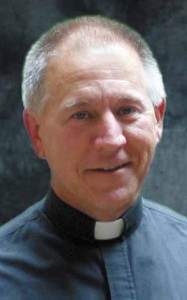By Fr. Bud Grant
Several weeks into the Easter season, my mind still goes back to Simon of Cyrene, who was conscripted by Roman soldiers carrying out the death penalty on Jesus (c.f. Mk. 15:21, Mt. 27:32, and Lk. 23-26). Simon was a diaspora Jew from the capital of Creta/Cyrenaica, in modern Libya. Who was he, what was he doing so far from home, how did he get caught up in the Passion of Christ? And why am I meditating on Simon in an article dedicated to Catholic environmental theology? Only the last question is easy to answer.

The evangelist Mark or his readers may have known Simon or his children, since he names the latter (Alexander and Rufus, whose Hellenized names signal their foreign-born roots). Matthew and Luke are either unfamiliar with this detail or simply choose to omit it. In any case, once he had performed his service we never hear of Simon again.
We can only speculate as to why he was in Israel. He may have been on pilgrimage to Jerusalem to celebrate the Passover. Or he may have been there on business. These are not mutually exclusive theories, of course. The Children of Israel had been scattered throughout the Roman world where they tended to live in ethnically homogenous neighborhoods that the Romans called “ghettos.” They spoke Greek, not Aramaic, but retained their traditions, sometimes more enthusiastically than did folks in the “old country” (like Irish-Americans celebrating St. Patrick’s Day or Mexican-Americans, Cinco di Mayo). Many were traders and merchants who, exploiting ethno-religious bonds, made connections among other diaspora Jewish communities. Simon could have been home visiting extended family, strengthening commercial ties, and scheduling his visit to coincide with the Passover.
In any case, Simon — a “passer-by” — was seized at random by soldiers and forced to carry the cross beam of the crucifix. The vertical beam was probably already set upright: upon arrival at Golgatha, Christ’s wrists were nailed to the cross beam, he was hoisted into place, then his ankles pinned to the upright beam. The soldiers who grabbed Simon were taking advantage of a law which permitted Rome’s forces to conscript local men to carry their packs (weighing upwards of 60 pounds) for one mile. This is the source of the phrase “go the extra mile” (c.f. Mt. 5.41, “if anyone should press you into service for one mile, go with him for two miles”).
It may be that Simon, or at least his sons, converted to Christianity. Yet, like so many intriguing characters we meet briefly in the New Testament, we never hear about him again. Still, I can’t forget his service to Christ in the form of a convicted criminal en route to his execution. Did he go willingly? Did he curse his ill luck? When, if ever, did he recognize Jesus as the Messiah? (I’m thinking of the nameless Centurion who, fantastically enough, announced his faith just when Jesus “breathed his last” (c.f. Mk. 15.39).
I am drawn to Simon, bearing upon his own shoulders the weight of Christ’s suffering, as a symbol of what I call “redistributive suffering.” This applies to environmental theology because those who are least responsible for the environmental crises that threaten, literally, to spill over our world, are the ones who bear the greatest suffering, while those of us who benefit the most, short-term, from these unsustainable practices bear the least share of the consequences. As Christians who are aware of this simple math, the witness of Simon is powerful: we ought to shift the weight of suffering off the back of the poor Christ of the marginalized and lift it up ourselves. This, by way of conclusion, will have an interesting practical consequence: like the addict who hits bottom or the infirm whose symptoms suddenly spike, once we feel that weight we may well be more interested in figuring out ways to alleviate it.
(Father Bud Grant is a professor of theology at St. Ambrose University in Davenport.)








